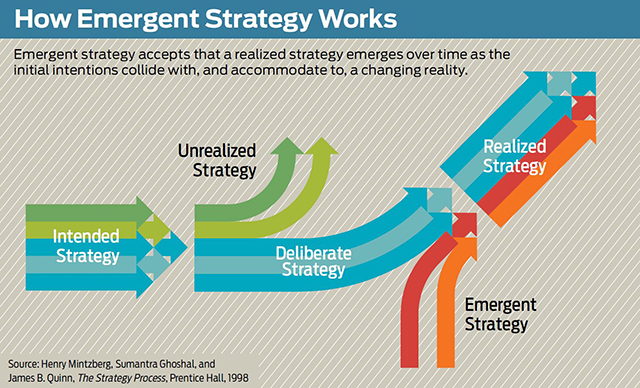
Shannon Johnson (11/14/14)
“If you want to make God laugh, tell him about your plans.” -Woody Allen
Our clients have hags…BHAGs that is (also known as big, hairy audacious goals). You have to if you are working to solve complex social problems. While Woody Allen’s quote is good for a laugh, we definitely do not think that planning is futile. We fundamentally believe that organizations need to have strategic plans to achieve their BHAGs. We’ll take the liberty to translate Mr. Allen’s quote to “The best plans will (and should) adapt over time.” I know, not quite as funny.
We were excited to see that the folks at Stanford Social Innovation Review (SSIR) shared the same view in a recent article and webinar “Strategic Philanthropy in a Complex World.” SSIR did a great job of explaining (and visualizing) the concept of emergent strategies. The concept is this:
- You start with your strategic plan to accomplish your BHAG (intended strategies)
- Some of those plans don’t pan out (unrealized strategies) – let’s drop those
- Fortunately, some plans do work (deliberate strategies) – of course, we’ll keep these
- Hopefully we’re learning along the way, and new ideas and opportunities arise (emergent strategies). Now, what to do with these? As Lloyd Christmas says in Dumb and Dumber, “We don’t usually pick up hitchhikers. But I’m-a gonna go with my instincts on this one. Saddle up, partner!

The SSIR language may be a bit formal, but the concept is simple: Start with your best thinking at the time, figure out what’s working, and adapt your plans with new strategies as they come. The concept of emergent strategies is freeing. You do not have to have it all figured out when you set out to create a strategic plan. Emergent strategy gives you permission to be “strategically opportunistic” and take advantage of new opportunities with confidence. And confidence looks great on you, by the way.
A charter school client of ours appreciated the nuance of being “strategically opportunistic.” Despite the constant flux of California’s education climate (due to frequent political and funding shifts), our client set a strategic direction with its staff and board leaders. They created a coherent vision for impact, prioritized specific investments and strategies, and considered various financial scenarios. Recently, this client had to let some unrealized strategies go. But by remaining flexible, they have stayed focused on achieving their overall goal of equipping students for college success.
Tell us: have you had to let go of an “unrealized strategy” recently? When did you know it was time to let it go? Have you had the opportunity to take advantage of an “emergent strategy”? Let us know in the comments section, or email us at hello@bluegarnet.net to share your thoughts!
